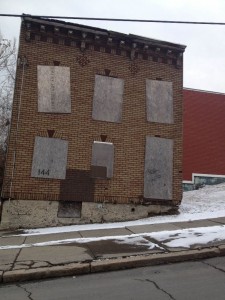Movements against inequality

With so many wealthy people, why are there still so many poor people? Income inequality has been a hot topic in recent national discussions, leaving many asking this question and trying to figure out how make society work for the poor.
Local groups are in on the action. Occupy Albany, an offshoot of the 2011 Occupy Wall Street protest, hosted an event at Westminster Baptist Church on Tuesday, Jan. 14. It was called the “rally for freedom for want,” which is a reference to a Franklin D. Roosevelt quote.
About 40 people attended the event that included speakers from local organizations and centered on the idea that everyone should have access to basic essentials such as food, shelter, work and health care.
“New York has the greatest income inequality of any state in the nation,” said Ron Deutsch from the Hunger Action Network. He also pointed out that cities in upstate New York have historically high levels of income inequality.
Inequality isn’t just an issue in New York. It’s a national trend that is getting worse. Since 1979, the average income of the top 1 percent of earners in America has increased by over 200 percent. Meanwhile, income for the bottom 20 percent has increased by only 40 percent. Wealth is even more concentrated. Statistics from 2007 show that the top 10 percent own over 70 percent of the wealth in the United States. Since 2009, 95 percent of income gains have gone to the top 1 percent.
There are over six million households in the United States with over $1 million dollars. Over 400,000 of these are in New York State and over 500 in the Capital Region. The wealthiest individuals in the local area are Guha and Karthik Bala, founders of the billion dollar video game company Vicarious Visions.
The numbers on the other side are a stark contrast. Nearly 50 million Americans are in poverty and about 2.8 million are in New York State alone. In the Capital Region there are over 100,000 people in poverty.
President Obama and the Democratic Party have pushed to make income inequality a big focus in 2014. The Democratic Party is often considered the party of the poor and struggling because of their history of promoting the use of government programs to assist those in need.
Major reform started under President Franklin Roosevelt when programs like social security and unemployment insurance were created. Lyndon Johnson expanded the safety net with Medicare and Medicaid 50 years ago, coining the phrase “war on poverty.”
Democratic policies include raising taxes on the wealthy, raising the minimum wage and improving on government benefit programs. Republicans generally believe in lowering taxes for individuals and corporations as a way to keep more money in the economy. Republicans also often see welfare programs and long term unemployment benefits as an incentive not to work.
The politics of it are frustrating. Democrats can get their people excited by raising sympathy for the poor and demonizing the wealthy. Republicans do the same by demonizing the government. It seems to constantly break down into hostile disagreements that take away from what is really important: the agreement that we need to minimize poverty. What we need isn’t perpetual policy argument, it is action in the community.
Occupy is a rare form of activism that isn’t aligned with a major party. Its ideology is liberal with strains of libertarianism in the group that opposes large government.
Most of what the country has done to reduce poverty has produced unsatisfactory results. Parties that struggle to work together and massive government debt make the prospect of government solutions uninspiring. We need more original brands of activism like Occupy. Although their numbers and visibility have waned since 2011, they have made an impact and are still around. Occupy may not be the movement that solves society’s problems, but it is an important template if successful reform is going to happen in our lifetime.
Poverty and inequality is a comprehensive problem and everyone is responsible. People will point to greedy corporations and their greedy CEOs, lazy workers or either political party. But it’s all of these things together. It’s built into the fabric of our society and will take drastic changes at all levels to improve the quality of life for those currently in poverty.
If the people of the Capital Region really wanted to close the income gap by lifting people out of poverty, it could be done. It’s an extremely difficult task that would take widespread participation that we do not currently have. When community and political activism is scarce, change will be scarce as well.
